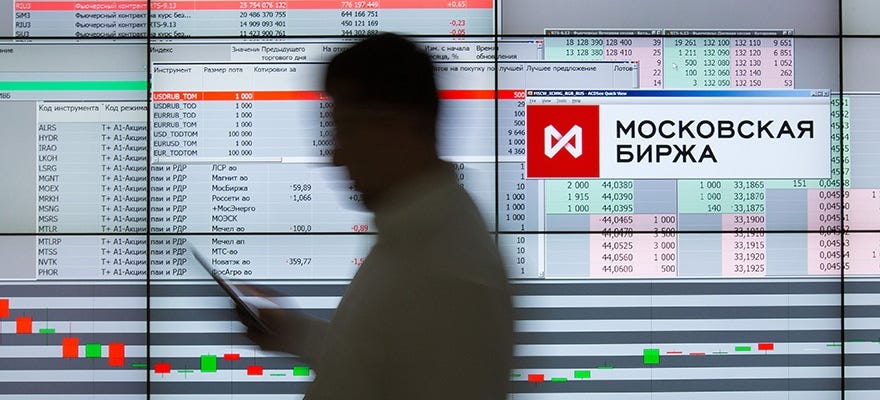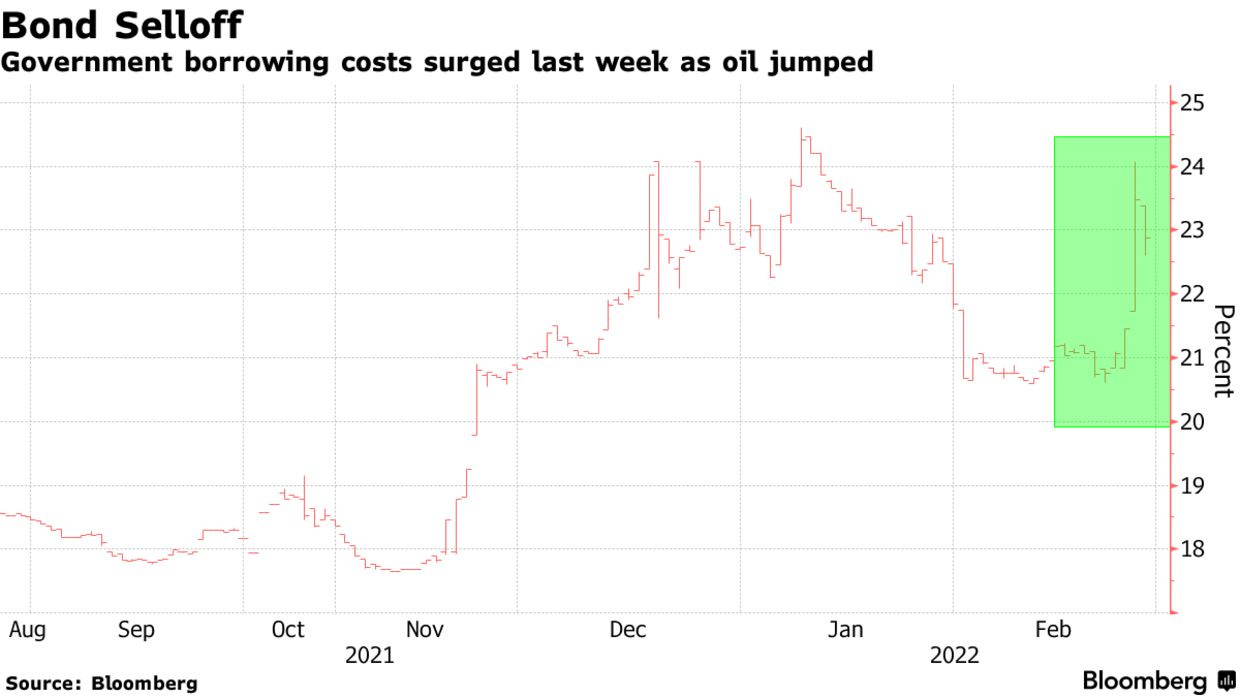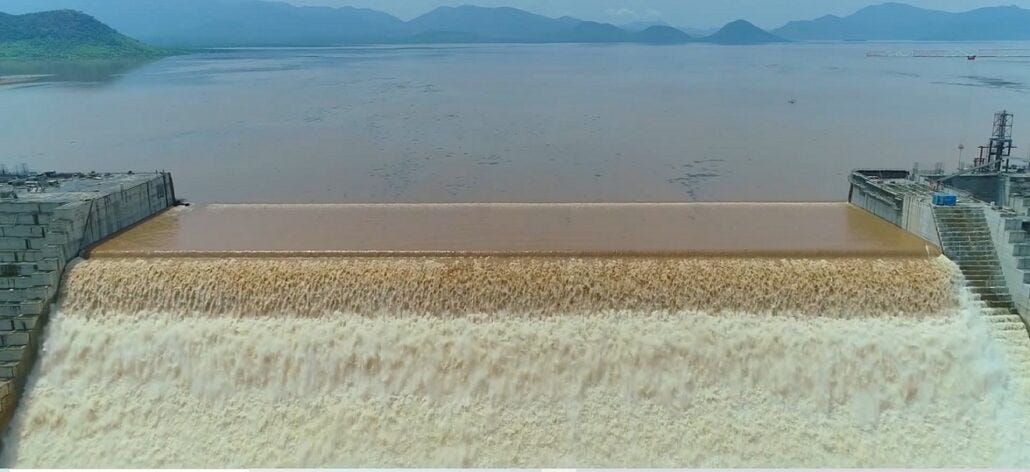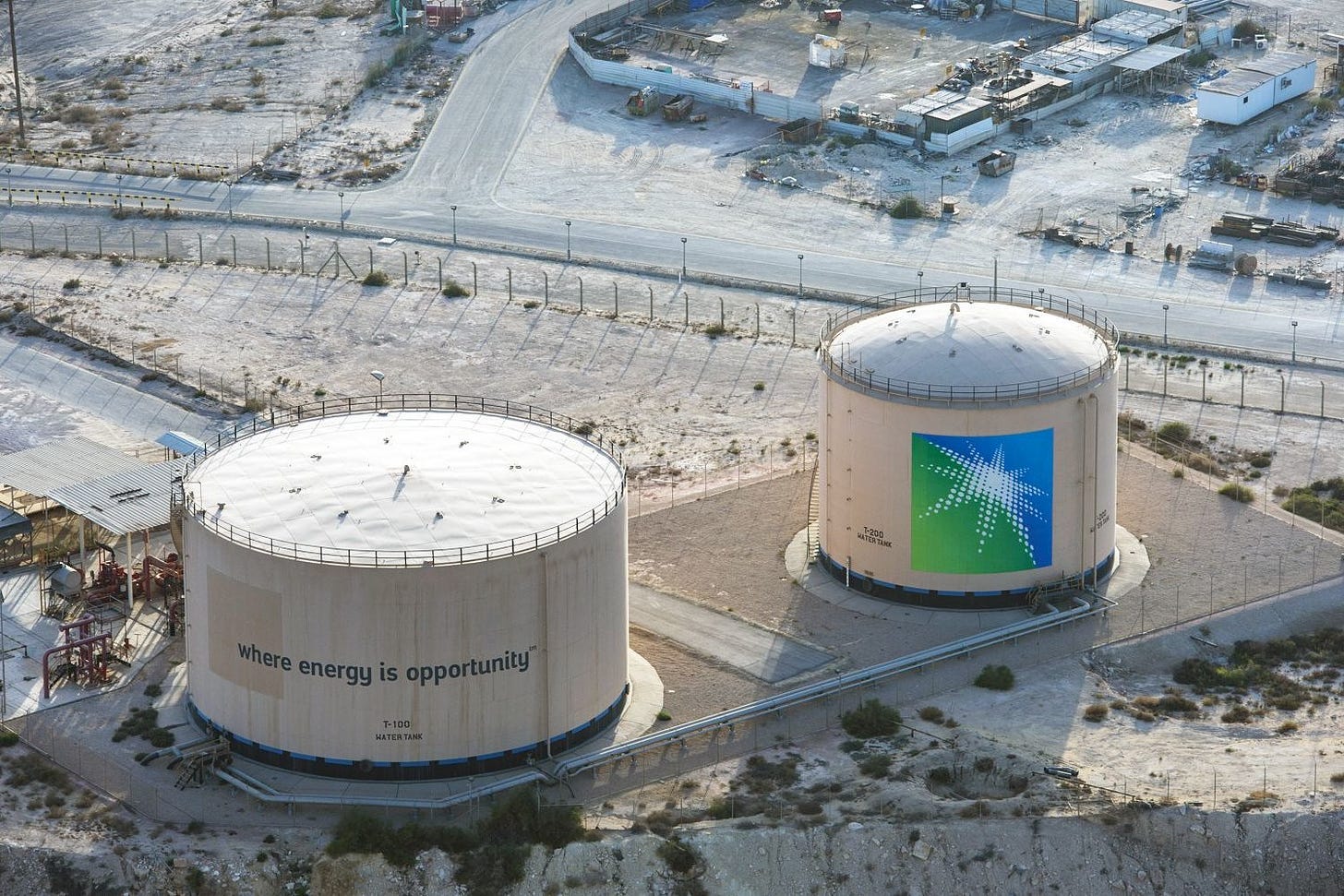Emerging Markets Daily - February 28
Russia Doubles Rates as Rouble Plunges, Oil Prices and EM's, Ethiopia Launches Nile Dam, Ukraine War and Supply Chain Woes, Saudi Arabia Discovers New Gas
The Top 5 Stories Shaping Emerging Markets from Global Media - February 28
Russia Doubles Interest Rate as Sanctions Send Rouble Plunging
Financial Times
“Russia’s central bank more than doubled interest rates on Monday in an attempt to steady the country’s financial markets, after unprecedented western sanctions sent the rouble tumbling as much as 29 per cent. The central bank boosted its main interest rate to 20 per cent from 9.5 per cent in an emergency decision, saying that ‘external conditions for the Russian economy have drastically changed’.”
“…Russia’s biggest foreign bond, a $7bn bond maturing in 2047, halved in price to 35 cents on the dollar, according to Tradeweb data….Trading in shares and derivatives on the Moscow Exchange was suspended, Russia’s central bank confirmed on Monday. However Russia-focused shares traded on other markets around the world dropped heavily.”
“…Sberbank, which the European Central Bank warned was ‘failing’, plummeted as much as 75 per cent and TCS Group, which owns Tinkoff, dropped as much as 78 per cent. Gazprom halved in value. The LSE said it would suspend the shares of VTB, the Russian bank, if it remained on the US list of sanctioned companies from May 25.”
“In a further sign of how Moscow is being pushed further to the fringes of world markets, Norway said on Sunday that its $1.3tn oil fund, the world’s biggest sovereign wealth fund, would freeze its investments in Russian assets and begin divesting from the country. BP, the UK energy group, also said it would divest the 20 per cent stake in Russian state-owned oil company Rosneft it had held since 2013.” The FT reports
Oil Jump Jolting Turkey Is Red Flag for Rest of Emerging Markets
Bloomberg
“Markets in Turkey are flashing warning signs that inflationary pressures are building in the developing world as oil prices spike.”
“Despite spending billions of dollars to shield the currency from surging energy prices last week, the lira extended the fifth-biggest depreciation in emerging markets since Feb. 11. The yield on two-year government notes jumped more than 210 basis points in the five days through Friday, second only to local debt issued by Russia, which now faces sanctions from the U.S. and its allies.”
“To be sure, the selloff was aggravated by Turkey’s extraordinarily loose monetary policy that has already fanned runaway consumer prices. But the aggressive repricing shows just how much is at stake for a country that imports almost all the oil and natural gas it consumes. And it points to headwinds that a whole gamut of energy-importing economies such as India and South Africa face after Russia invaded Ukraine.”
“The MSCI Emerging Markets Currency Index posted its first weekly decline in a month, and the second largest this year. It comes as imminent rate hikes in the U.S. threaten to drain capital from the developing world. Traders are now betting on as many as six quarter-point hikes from the Federal Reserve this year, starting in March.”
“India, the Philippines and Thailand will likely stand to lose the most in Asia as a sustained increase in oil fans inflation, slows growth and weakens their currencies, according to Nomura Holdings Inc. Their central banks have signaled that they plan to stay accommodative for as long as needed to support growth, which runs the risk of driving consumer prices higher.”
“For Citigroup Inc., other countries that are vulnerable include Chile and Hungary, which raised its key interest rate as expected last week. Deputy Governor Barnabas Virag said inflation risks have ‘unequivocally strengthened’ since last month and all rate-setters back the need for a continuation of the rate-hike cycle.” Bloomberg reports.
Ethiopia Switches on Nile Dam, Defying Egypt and Sudan
African Business
“Ethiopia generated its first electricity from the controversial Grand Ethiopian Renaissance Dam (GERD) on Sunday, putting further pressure on negotiations with downstream stakeholders Sudan and Egypt who claim the hydropower plant will threaten their water supply.”
“Prime minister Abiy Ahmed officially inaugurated the $4.2bn megaproject, situated on the Blue Nile River in western Ethiopia, which began producing power from a 375 MW turbine. Abiy said Ethiopia had reached a historic milestone with the dam, which with a total capacity of 5.15 GW is planned to more than double the electricity output of Africa’s second most-populous country.”
“The unilateral move adds to a long list of failed negotiations between all three parties. The second phase of the dam was filled last July, leading former Egyptian minister of Irrigation, Mohammed Nasr Allam, to say that ‘what Ethiopia is doing is an aggression and a clear threat to Egyptian and Sudanese national securities’.”
“Now that the GERD is operational, Egypt’s foreign ministry said that Ethiopia is ‘persisting in its violations’ of a preliminary deal signed between the three stakeholders in 2015, prohibiting any of the parties from acting unilaterally.”
“…The Blue Nile contributes approximately 85% to the volume of the main Nile River, leading Egypt and Sudan, which both depend heavily on the river for agriculture and irrigation, to see the GERD as an existential threat. Ethiopia continues to insist that the dam will not affect access to water in downstream countries.” Tom Collins reports.
War in Ukraine Threatens New Shortages, Supply Chain Woes
Wall Street Journal
“Russia’s invasion of Ukraine is piling new troubles onto the world’s already battered supply chains. The fighting has shut down car factories in Germany that rely on made-in-Ukraine components and hit supplies for the steel industry as far as Japan. It has severed airways and land routes that had become crucial since the pandemic began gumming up sea trade.”
“The conflict is also bottling up Ukraine and Russia’s vast commodity exports, sending the price of oil, natural gas, wheat and sunflower oil rocketing. Shipping from Ukrainian ports, an important corridor for grain, metal and Russian oil shipments to the rest of the world, has all but ceased.”
“Freighters and airlines have warned that the decision by many European nations to close their airspace to Russia, as well as Russia’s tit-for-tat retaliation, will increase the cost of flying cargo from Europe to Asia, potentially making some routes commercially unviable.”
“Western sanctions—especially banning some Russian banks from the Swift global financial payment system—will make it cumbersome for many companies to conduct any type of trade with the country, even in sectors that aren’t being sanctioned. There is also the risk of sanctions on individual Russian commodity players, or of Russia retaliating by choking off supply of its products.”
“Economists and business leaders fear this will hit supply chains that rely on components and little-known commodities from Russia such as neon gas and palladium, important ingredients to make semiconductors. Industries such as car manufacturing have already been disrupted by a surge in demand after the easing of pandemic lockdowns and persistent production bottlenecks.” WSJ reports.
Saudi Arabia Discovers Five New Gas Fields
S&P Platt’s
“Saudi Arabia has discovered five conventional and unconventional gas fields across the country, energy minister Prince Abdulaziz bin Salman said Feb. 27, as the world's biggest crude exporter boosts gas exploration and production to free up oil used domestically for export.”
“State-run Saudi Aramco discovered a field in the central region 180 km southeast of the capital Riyadh, with a flow rate of 27 MMcf/d and 3,300 b/d of condensate, Prince Abdulaziz said in a statement carried by the official Saudi Press Agency.”
Aramco also discovered a gas field in the Empty Quarter desert, 70 km southwest of the Shaybah oil field, with a flow rate of 31 MMcf/d, and another field in the Empty Quarter lying 120 km southwest of Shaybah at a flow rate of 16.9 MMcf/d and 50 b/d of condensate.
Along the northern border, Aramco found an unconventional gas field 71 km southeast of the city of Arar, with a flow rate of 2 MMcf/d and 295 b/d of condensate.
“Saudi Arabia sits on 17.2% of the world's proven oil reserves and 3.2% of proven gas reserves as of the end of 2020, according to BP's Statistical Review for World Energy 2021. Aramco averaged 9.03 Bcf/d of gas production in 2020, according to its most recent annual report. The bulk of the output comes from associated gas pumped along with Saudi Arabia's massive crude oil production.”
“But the company is hoping to ramp up development of its non-associated gas reserves, including its Jafurah shale play in the Eastern Province, which holds some 200 Tcf of resource, as it seeks to reduce the amount of oil consumed in its power plants for electricity generation.” Dania Saadi reports.
"If you’re going through hell, keep going." - Winston Churchill.





